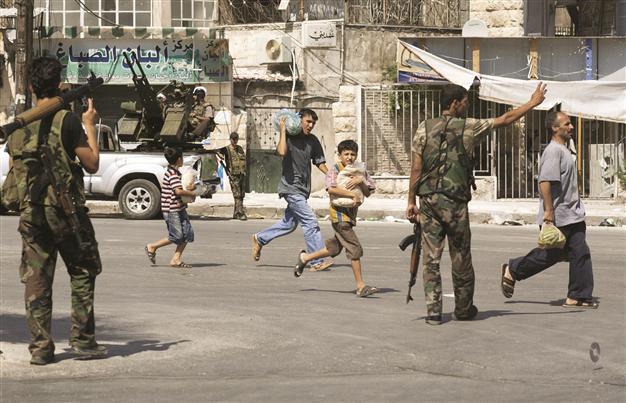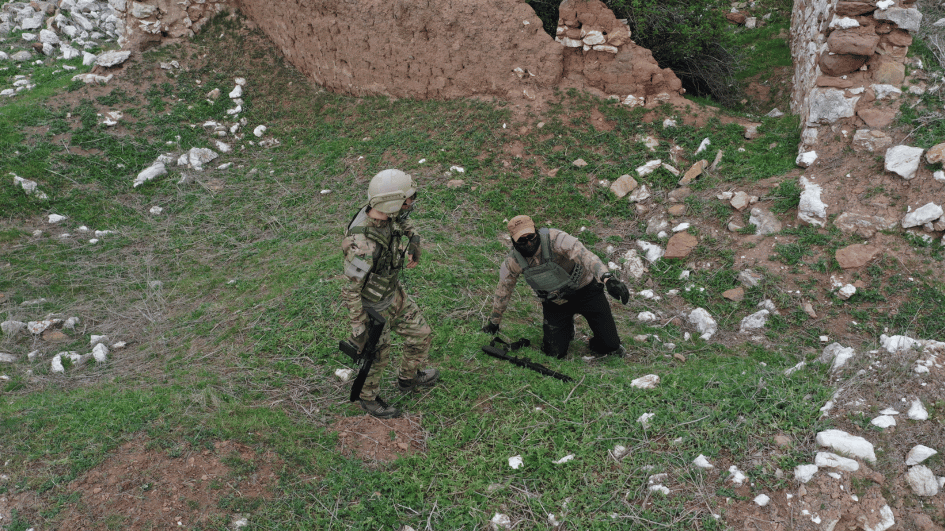Syrian rebels pledge not to ‘take part’ in executions
ISTANBUL - Hürriyet Daily News

Civilians run past a Free Syrian Army checkpoint in the Saif al-Dawla neighbourhood of Aleppo. With the West still refusing to arm Syria’s opposition in the bloody fight against the regime, rebels in Aleppo warn that they could turn to al-Qaeda for help. AFP photo
Following harsh accusations from the international community and the U.N., after images and video alleged executions of Syrian regime loyalists by the rebel Free Syrian Army (FSA) surfaced, the FSA has released a “code of conduct” in which it pledges “not to engage in any practice that leads to the physical torture or murder of prisoners or informants, and not to participate in any public execution.”“I will not issue any executive orders, particularly with regard to death or corporal punishment,” the code of conduct, which is signed by the 30 leaders of the local coordination committees of the FSA, reads.
Syrian rebels fighting to unseat President Bashar al-Assad face a growing list of accusations that they have been involved with executions and torture. A video was posted online two weeks ago showing the aftermath of the apparent executions of pro-al-Assad militiamen during the rebels’ capture of an intelligence center in Aleppo. The leadership of the rebel army condemned and denied responsibility for the execution of regime loyalists in the northern city of Aleppo.
Accussation from UN
However the Free Syrian Army in northern Syria had defended the execution of figures loyal to Damascus while chiding the group’s leaders in Turkey for condemning the summary killings, the Hürriyet Daily News reported on Aug. 6.
The U.N. on Aug. 15 said for the first time that both Syrian President Bashar al-Assad’s forces and rebels have perpetrated war crimes, in a highly anticipated report that spells out clear responsibility for attacks on civilians and that could be used in possible prosecutions against the leader and others. It also contained an ominous warning that Syria’s 17-month-old civil war was moving in “brutal” directions on all fronts, as Assad’s forces step up air assaults and anti-government armed groups seek stronger firepower to fight back. The FSA code of conduct emphasizes a commitment to respect for human rights and international humanitarian law, and pledges that the group will not practice any form of torture, rape, mutilation, or degradation. “I will preserve prisoners’ rights and will not exercise any of the above practices in order to obtain confessions,” the code said.
“In the Free Syrian Army, as an independent, defected soldier, or civilian volunteer, my first responsibilities are to defend Syrian revolutionaries in the face of tyranny and ensure the continuation of the revolution to oust the regime. I will direct my weapons exclusively against al-Assad’s aggressors,” the code of conduct said, continuing: “I pledge not to engage in any form of theft or looting on the pretext that I am helping to finance the armed struggle. I pledge not to take any person hostage for ransom. I pledge not to exercise reprisals on the basis of ethnicity, sect, religion, or any other basis, and to refrain from any abusive practices, in word or in deed, against any component of the Syrian people.”
















